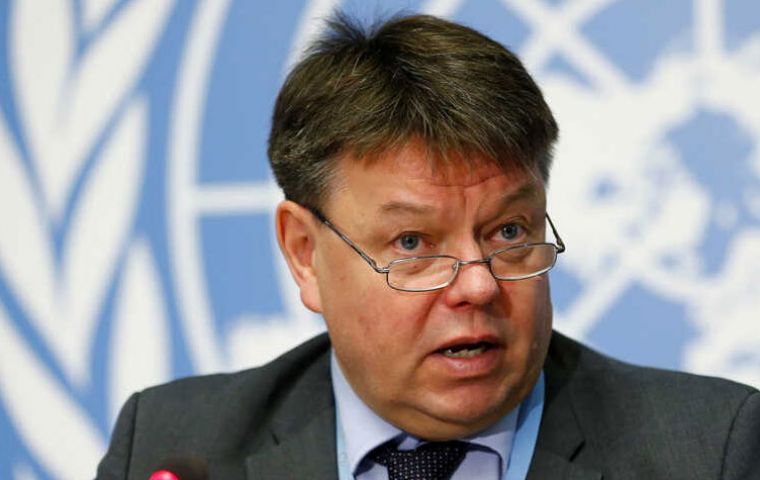MercoPress. South Atlantic News Agency
Meteorologists meet to prepare report for the UN Glasgow climate change negotiations summit
 WMO Secretary-General Prof. Petteri Taalas said that the forthcoming report was critical to the outcome of UN climate change negotiations in Glasgow
WMO Secretary-General Prof. Petteri Taalas said that the forthcoming report was critical to the outcome of UN climate change negotiations in Glasgow The Intergovernmental Panel on Climate Change, IPCC, opened its meeting on Monday to approve its next report on the physical science basis of climate change, the first part of the Sixth Assessment Report.
The report, prepared by IPCC Working Group I, will provide an up-to-date physical understanding of the climate system and climate change, bringing together the latest advances in climate science and multiple lines of evidence.
The meeting is being held remotely, the first time the IPCC has conducted an approval session in this format, from 26 July to 6 August 2021, because of the impact of the COVID-19 pandemic. Subject to the decisions of the Panel, the report will be released on 9 August.
“This report has been prepared in exceptional circumstances, and this is an unprecedented IPCC approval session, “IPCC Chair Hoesung Lee told the opening of the meeting.
“This work has required multiple series of virtual meetings across time zones, disrupting daily lives and work rhythms, especially in the most critical phase of the last 16 months as we shaped the final draft,” he said.
The report, ”Climate Change 2021: the Physical Science Basis”, will provide the latest knowledge on past warming and future warming projections, showing how and why the climate has changed to date, and including an improved understanding of human influence on the climate including extreme events.
There will be a greater focus on regional information that can be used for climate risk assessments.
WMO Secretary-General Prof. Petteri Taalas said that the forthcoming report was critical to the outcome of the United Nations climate change negotiations in Glasgow in November. Political interest is high, but the challenge lies in implementing the Paris Agreement and cutting greenhouse gas emissions, he said.
“Climate change is already very visible. We don’t have to tell people that it exists,” Prof Taalas told the opening session. “We are seeing more extreme events. Heatwaves, drought and the flooding events in Europe and China,” he said.
“Massive heating” in the Arctic is affecting the atmospheric dynamics in the northern hemisphere, as evidenced by stagnant weather systems and changes in the behavior of the jet stream, said Prof. Taalas.
UN Climate Change Executive Secretary Patricia Espinosa said that the world is at a “climate crossroads” and that decisions taken this year would determine whether it will be possible to limit global warning to 1.5°C above the pre-industrial era by the end of the century. The world is currently on the opposite track, heading for a 3°C rise, she said.
The IPCC was established by UNEP and WMO in 1988 to provide political leaders with periodic scientific assessments concerning climate change, its implications and risks, as well as to put forward adaptation and mitigation strategies.




Top Comments
Disclaimer & comment rulesCommenting for this story is now closed.
If you have a Facebook account, become a fan and comment on our Facebook Page!